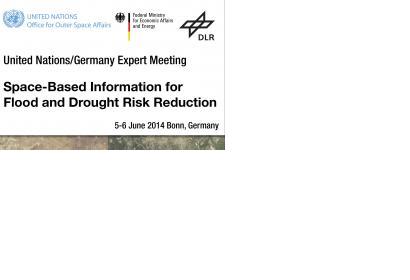
UNOOSA/UN-SPIDER
German Aerospace Center (DLR ), German Federal Ministry for Economic Affairs and Energy (BMWi), Secure World Foundation (SWF)
This year’s United Nations/Germany Expert Meeting on the Use of Space-based Information for flood and drought risk reduction will focus on the use of space technologies to improve disaster risk reduction. Floods and droughts will serve as examples for hazard types that have recently affected countries around the globe. Recent examples are the UK floods in February 2014, floods in Central Europe in June 2013, the floods following super typhoon Haiyan in the Philippines in November 2013, or the droughts in Eastern Africa 2011 and droughts in Bolivia in 2013.
In its current Situation and Outlook issued in January 2014, WMO foresees an enhanced possibility of the development of a weak El Niño around the middle of 2014. Its effects on floods and droughts need to be taken into account in national plans targeting disaster risk reduction. A recent article in Nature stated that El Niño events may start coming once every decade, doubling their frequency.
Effective disaster risk management helps preventing that natural hazards like floods and droughts turn into disasters. Space technologies, especially Earth observation and global navigation satellite systems, provide crucial information for hazard assessment, vulnerability analysis, and risk assessment. The potential contribution of space-based information to disaster risk management is not yet fully exploited – technical solutions are not tailored enough to the needs on the ground, and the information is rarely easily accessible for disaster managers. With this expert meeting, UN-SPIDER is aiming to fulfil one of its core functions: serving as a bridge between the different space and disaster risk management communities.
Objectives and Expected Outcomes
The main objective of the expert meeting is to promote the use of space-based applications to assess and to manage flood and drought risks.
Expected outcomes include:
• Recommendations for the improvement of flood and drought risk management through the use of space based information;
• Elements to contribute to the Post 2015 framework for disaster risk reduction (HFA2) and to sustainable development;
• Elements to contribute to the upcoming World Conference on Disaster Risk Reduction to take place in Sendai, Japan, in March 2015.
These outcomes will feed into UN-SPIDER’s outreach activities, capacity building, Knowledge Portal, and Technical Advisory Support.
Financial Support to Selected Participants
Taking into consideration the limited financial resources available for this expert meeting, a number of qualified applicants from developing countries, who have expressed the need for financial support, will be offered financial support to attend the expert meeting. This may include the provision of a round-trip air ticket between Bonn and the applicant’s international airport of departure or daily subsistence allowances to cover board and lodging for the duration of the Expert meeting. Any changes made to the air tickets must be the responsibility of the participants.
Due to this limited availability of financial resources, applicants and their nominating organizations are strongly encouraged to find additional sources of sponsorship to allow them to attend the Expert meeting. Qualified participants whose nominating agency/organization agrees to fund round-trip travel and/or living expenses will be considered on a priority basis.
Point of Contact
Antje Hecheltjen (Ms.), UN-SPIDER Office for Outer Space Affairs, UN Campus Bonn
Tel: +49 (0) 228 815 0677, Fax: +49 (0)228 815 0699, E-mail: antje.hecheltjen [at] unoosa.org
| Keynote presentations | |
|---|---|
| Stefan Voigt (DLR): Earth Observation contributions to flood and drought risk assessment | Download |
| Ray Williamson (SWF): Bridging the gap: Satellite data, information, and disaster management | Download |
| Luc St-Pierre and Juan Carlos Villagran: UN-SPIDER's efforts in flood and drought risk management | Download |
| Session 1: Space technologies for disaster risk reduction - Regional examples | |
| AKM Monowar H. Akhand (Ministry of Public Administration Bangladesh): Preparedness strategies, local administration and the role of space-based data in reduction of flood risk in Bangladesh | Download |
| Byron Anangwe (RCMRD, Kenya): Disaster Risk Reduction dynamics and Earth Observation - African scenarios | Download |
| Session 2: Flood Risk Reduction | |
| Sebastian Pisi (DKKV, Germany): Assessment of coping capacities relating to the 2013 floods in Germany | Download |
| André Twele and Franz Hummel (DLR, Germany): Combining automated satellite based flood mapping and exposure mapping for flood risk assessment and management | Download |
| Wazir Khan (Pakistan): Application of Space Technology for Disaster Management in Pakistan | Download |
| Session 3: Drought Risk Reduction | |
| Jeiran Amiraslani (ISA, Iran): Role of E-Learning in knowledge promotion and capacity building for monitoring and assessment of natural disasters - A case study for drought monitoring | Download |
| Peter Hoefsloot (ARC, Netherlands): African Risk Capacity (ARC) & World Food Programme | Download |
| John M. Ferrell (US SOUTHCOMM): United States Southern Command Technology Approaches for Enabling Multi-National Activities | Download |
| Session 4: The Way Forward | |
| Luna Abu-Swaireh (UNISDR): Towards the post-2015 framework for disaster risk reduction | Download |
| Background documents | |
| Bonn Expert Meeting 2014 - Programme of Activities | Download |
| Bonn Expert Meeting 2014 - Information for Participants | Download |
| Bonn Expert Meeting 2014 - Flyer | Download |
| Bonn Expert Meeting 2014 - Information Note | Download |
| Bonn Expert Meeting 2014 - Background Paper Discussion Groups | Download |
| Outcome documents | |
| Two-pager: Space-based information for disaster-risk reduction - KEY MESSAGES | Download |
